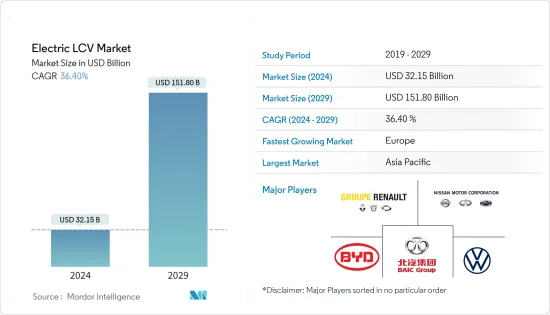
|
시장보고서
상품코드
1435805
전기 LCV : 시장 점유율 분석, 산업 동향 및 통계, 성장 예측(2024-2029년)Electric LCV - Market Share Analysis, Industry Trends & Statistics, Growth Forecasts (2024 - 2029) |
||||||
전기 LCV 시장 규모는 2024년 321억 5,000만 달러로 추정되며, 2029년까지 1,518억 달러에 달할 것으로 예상되며, 예측 기간(2024-2029년) 동안 36.40%의 CAGR로 성장할 것으로 예상됩니다.

주요 하이라이트
- 급속한 도시화, 엄격한 배출 규제, 배터리 기술의 발전으로 인해 예측 기간 동안 전기 LCV에 대한 수요가 증가할 것으로 예상됩니다. 선진국 시장에서는 이미 전기 승용차 도입이 진행되고 있으며, LCV 시장의 신흥 기업과 대기업은 향후 몇 년 내에 새로운 전기 모델을 출시할 예정입니다.
- 도시들은 초저공해 구역을 도입하여 디젤 차량의 통행을 제한하고 있습니다. 또한 정부 보조금, 운영 및 유지보수 비용 절감, 초저공해 구역에 대한 접근성 등으로 인해 전기 상용차는 향후 비지니스에 매력적인 선택이 될 수 있습니다.
- EV 배터리 라인업이 빠르게 확대되고 있습니다. 현재 최대 600 마일의 주행 거리를 가진 새로운 모델이 시장에 출시되었습니다. 트럭과 밴의 차체 크기가 승용차에 비해 크기 때문에 더 많은 배터리를 탑재하여 장거리 주행이 가능합니다. 대형 전기 모터는 견인 및 운반 능력에 따라 엄청난 양의 토크를 생성 할 수 있습니다. 예를 들어, 니콜라(Nikola)의 배저(Badger) 픽업 트럭은 연료전지 기술과 배터리 덕분에 600마일을 주행할 수 있습니다.
전기 LCV 시장 동향
전기 밴이 전기 LCV 시장을 주도
도시 인구가 빠르게 증가함에 따라 세계 각국 정부는 디젤 차량과 밴을 금지할 계획을 세우고 있습니다. 예를 들어,
- 영국은 2040년까지 모든 종류의 가솔린 및 디젤 엔진 차량 판매를 금지할 계획입니다. 인도는 2030년까지 모든 종류의 디젤 엔진 차량의 도로 운행을 금지할 계획입니다.
- 노르웨이는 시대를 앞서가고 있으며, 2025년까지 모든 신차를 무공해 차량으로 만들 계획입니다.
전기차 수요가 증가함에 따라 사업주들은 기존 차량을 전기차로 교체하기 시작했고, 시장 관계자들은 새로운 전기자동차 모델 출시 계획을 발표했습니다. 2019년 포드는 2021년까지 유럽 시장에 대량 판매용 상용 밴 'Transit EV'의 전기 버전을 출시할 계획을 발표했습니다. 밴은 유럽 소형 상용차 전체 판매량의 80%를 차지하고 있습니다.
밴은 건설, 우편 및 택배 서비스, 구급차 서비스, 경찰 및 구조 활동, 이동식 작업장, 여객 운송 등 다양한 상업 활동에 사용됩니다.
아시아태평양이 전기 LCV 시장을 주도할 것으로 예상
아시아태평양은 저렴한 원자재 가용성, 낮은 인건비, 많은 업계 종사자, 많은 인구, 정부 참여 등의 이유로 전기자동차 산업의 중심지가 되고 있습니다. 예를 들어, 중국 정부는 전기자동차 산업을 지원하기 위해 연구 개발 자금, 세금 면제, 배터리 충전소 융자 등 약 600억 달러를 투자했습니다.
중국 기업들은 자국 시장에서 좋은 성과를 거둔 후 다른 국가에서도 시장 입지를 확대하기 위해 노력하고 있습니다. 예를 들어, 2019년 중국 최대 전기자동차 제조업체인 BYD 그룹은 인도에 T3 순수 전기 상업용 물류 미니밴과 T3 순수 전기 승용 MPV 등 2대의 순수 전기 상용차를 도입했습니다.
유럽에서는 전기 밴의 시장 견인력이 증가하고 있으며, 시장의 주요 기업들이 이 지역에서 새로운 전기 밴을 출시하고 있습니다. 예를 들어,
2019년 르노그룹은 MASTER ZE Hydrogen과 KANGOO ZE Hydrogen이라는 두 가지 수소전기상용차를 출시했습니다. 이 회사는 또한 차량의 주행 거리를 120km에서 최대 350km까지 연장했습니다.
전기 LCV 산업 개요
전기 LCV 시장은 적당히 통합되어 있으며, 활동적인 플레이어의 수는 제한되어 있습니다. 시장에서는 신생 기업 및 기존 기업이 다양한 새로운 전기 모델을 출시하는 것을 볼 수 있습니다. 시장의 주요 기업으로는 BYD 그룹, 닛산 자동차, 르노 그룹, 폭스바겐 AG 등이 있습니다. 이들은 시장의 다른 기업들과 전략적 제휴를 맺고 새로운 전기 소형 상용차를 출시하여 입지를 확대하고 있습니다. 예를 들어,
- 2020년 전기 밴 제조업체인 Arrival은 United Parcel Service(UPS)로부터 4억 2,800만 달러에 차량 1만 대를 수주했습니다. UPS는 또한 이 신생 기업의 주식을 매입할 계획이며, Arrival은 이미 현대와 기아로부터 1억 달러 이상의 자금을 지원받은 바 있습니다.
- 2019년 리비안 오토모티브는 다양한 자금 출처로부터 총 13억 달러의 자금을 받았습니다. 또한 이 스타트업은 2019년 9월 아마존과 협력하여 전기 배송 밴을 개발할 계획을 발표했으며, 총 10만 대의 전기 밴을 아마존에서 주문하여 2021년까지 배송을 시작할 예정입니다.
- 2019년 테슬라는 캘리포니아 주 로스앤젤레스에서 사이버트럭이라는 이름의 첫 번째 전기 픽업 트럭을 출시했습니다. 사이버트럭은 최대 주행거리 200마일, 300마일, 500마일의 세 가지 변형이 있으며, 첫 배송은 2021년까지 예정되어 있습니다.
기타 혜택
- 엑셀 형식의 시장 예측(ME) 시트
- 3개월간 애널리스트 지원
목차
제1장 서론
- 조사 가정
- 조사 범위
제2장 조사 방법
제3장 주요 요약
제4장 시장 역학
- 시장 성장 촉진요인
- 시장 성장 억제요인
- 업계의 매력 - Porter's Five Forces 분석
- 신규 참여업체의 위협
- 구매자/소비자의 협상력
- 공급 기업의 교섭력
- 대체품의 위협
- 경쟁 기업 간의 경쟁 강도
제5장 시장 세분화
- 추진 유형별
- BEV
- HEV
- FCEV
- 차종별
- 밴
- 픽업 트럭
- 출력별
- 100 kW 미만
- 100-250 kW
- 250 kW 이상
- 지역별
- 북미
- 미국
- 캐나다
- 기타 북미
- 유럽
- 독일
- 영국
- 프랑스
- 기타 유럽
- 아시아태평양
- 인도
- 중국
- 일본
- 한국
- 기타 아시아태평양
- 세계 기타 지역
- 브라질
- 멕시코
- 아랍에미리트
- 기타
- 북미
제6장 경쟁 상황
- 벤더 시장 점유율
- 기업 개요
- BYD Group
- Nissan Motor Co.
- BAIC Group
- Rivian Automotive
- Renault Group
- Tesla Inc.
- Volkswagen AG
- Groupe PSA
- Arrival Ltd
- Mahindra and Mahindra Ltd
- Tata Motors Limited
제7장 시장 기회와 향후 동향
ksm 24.03.06The Electric LCV Market size is estimated at USD 32.15 billion in 2024, and is expected to reach USD 151.80 billion by 2029, growing at a CAGR of 36.40% during the forecast period (2024-2029).

Key Highlights
- The rapid urbanization, stringent emission regulations, and advancements in battery technology are expected to fuel the demand for electric LCVs during the forecast period. The market is already witnessing the adaptation of electric passenger vehicles in developed countries, and the start-ups and major players in the LCV market are planning to introduce their new electric models in the coming years.
- Cities are restricting the access of diesel vehicles through the implementation of ultra-low emissions zones. Additionally, government grants, lower running and servicing costs, and access to ultra-low emissions zones can make electric commercial vehicles an attractive choice for business in the future.
- The EV battery range is growing rapidly. Presently, new models are being launched in the market witha range of up to 600 miles. Trucks and vans' body sizes are bigger compared to passenger cars, thus, they can accommodate more batteries for a longer range. Big electric motors can create enormous amounts of torque for towing and hauling capacities. For instance, Nikola's Badger pickup truck has a range of 600 miles, owing to its fuel cell technology and batteries.
Electric LCV Market Trends
Electric Van is Leading the Electric LCV Market
The population in urban areas is growing rapidly, owing to which, governments across the world are planning to ban diesel cars and vans. For instance,
- The United Kingdom is planning to ban sales of all types of gasoline and diesel engine cars by 2040. India is planning to ban all types of diesel-engine cars on the roads by 2030.
- Norway is way ahead of the curve, and it plans to make every new car a zero-emission car by 2025.
With the growing demand for electric vehicles, business owners have started replacing their existing fleets to electric vehicles, and market players are announcing the expected launch of their new electric models. In 2019, Ford announced its plans to launch its mass-selling Transit commercial van in an electric variant, named as Transit EV, in the European market by 2021. Vans contribute 80% of the total light commercial vehicle sales in Europe.
Vans are used for a wide range of commercial activities, such as construction, postal and courier services, ambulance services, policing and rescue operations, mobile workshops, and passenger transportation.
Asia-Pacific is Expected to Lead the Electric LCV Market
Asia-Pacific is the hub of the electric vehicle industry, owing to the availability of cheap raw materials, low labor cost, presence of numerous industry players, large population, and government participation. For instance, the Chinese government spent around USD 60 billion to support the electric-vehicle industry, including R&D funding, tax exemptions, and financing for battery-charging stations.
Chinese players, after performing well in their local markets, are trying to expand their market presence in other countries. For instance, in 2019, BYD Group, China's largest electric vehicle manufacturer, introduced its two pure electric commercial vehicles in India, namely, T3 pure electric commercial logistics minivan and T3 pure electric passenger MPV.
Europe is gaining traction in the market with the help of electric vans, and major players in the market are launching new electric vans in the region. For instance,
In 2019, Renault Group launched two hydrogen-electric commercial vehicles, namely, MASTER Z.E. Hydrogen and KANGOO Z.E. Hydrogen. The company is also increasing its range of vehicles from 120 km to up to 350 km.
Electric LCV Industry Overview
The electric LCV market is moderately consolidated, and it has a limited number of active players. The market is witnessing the launch of various new electric models by start-ups and established players. Some of the major players in the market are BYD Group, Nissan Motor Co., Renault Group, and Volkswagen AG, among others. The companies are expanding their presence by forming strategic alliances with other players in the market and launching new electric LCVs. For instance,
- In 2020, Arrival, an electric van manufacturer, won a USD 428 million order from United Parcel Service (UPS) for 10,000 vehicles. UPS is also planning to buy an equity stake in the start-up. Arrival already received over USD 100 million in funding from Hyundai and KIA.
- In 2019, Rivian Automotive received a total of USD 1.3 billion in funding from different sources. Also, in September 2019, this start-up announced its plans to collaborate with Amazon for an electric delivery van, and a total of 100,000 of these electric vans have been ordered by Amazon, with deliveries expected to start by 2021.
- In 2019, Tesla launched its first electric pickup truck named Cybertruck, in Los Angeles, California. Cybertruck comes in three variants with a maximum range of 200 miles, 300 miles, and 500 miles, with the first delivery expected by 2021.
Additional Benefits:
- The market estimate (ME) sheet in Excel format
- 3 months of analyst support
TABLE OF CONTENTS
1 INTRODUCTION
- 1.1 Study Assumptions
- 1.2 Scope of the Study
2 RESEARCH METHODOLOGY
3 EXECUTIVE SUMMARY
4 MARKET DYNAMICS
- 4.1 Market Drivers
- 4.2 Market Restraints
- 4.3 Industry Attractiveness - Porter's Five Forces Analysis
- 4.3.1 Threat of New Entrants
- 4.3.2 Bargaining Power of Buyers/Consumers
- 4.3.3 Bargaining Power of Suppliers
- 4.3.4 Threat of Substitute Products
- 4.3.5 Intensity of Competitive Rivalry
5 MARKET SEGMENTATION
- 5.1 By Propulsion Type
- 5.1.1 BEV
- 5.1.2 HEV
- 5.1.3 FCEV
- 5.2 By Vehicle Type
- 5.2.1 Van
- 5.2.2 Pick-up Truck
- 5.3 By Power Output
- 5.3.1 Less Than 100 kW
- 5.3.2 100 -250 kW
- 5.3.3 More Than 250 kW
- 5.4 By Geography
- 5.4.1 North America
- 5.4.1.1 United States
- 5.4.1.2 Canada
- 5.4.1.3 Rest of North America
- 5.4.2 Europe
- 5.4.2.1 Germany
- 5.4.2.2 United Kingdom
- 5.4.2.3 France
- 5.4.2.4 Rest of Europe
- 5.4.3 Asia-Pacific
- 5.4.3.1 India
- 5.4.3.2 China
- 5.4.3.3 Japan
- 5.4.3.4 South Korea
- 5.4.3.5 Rest of Asia-Pacific
- 5.4.4 Rest of the World
- 5.4.4.1 Brazil
- 5.4.4.2 Mexico
- 5.4.4.3 United Arab Emirates
- 5.4.4.4 Other Countries
- 5.4.1 North America
6 COMPETITIVE LANDSCAPE
- 6.1 Vendor Market Share
- 6.2 Company Profiles
- 6.2.1 BYD Group
- 6.2.2 Nissan Motor Co.
- 6.2.3 BAIC Group
- 6.2.4 Rivian Automotive
- 6.2.5 Renault Group
- 6.2.6 Tesla Inc.
- 6.2.7 Volkswagen AG
- 6.2.8 Groupe PSA
- 6.2.9 Arrival Ltd
- 6.2.10 Mahindra and Mahindra Ltd
- 6.2.11 Tata Motors Limited



















